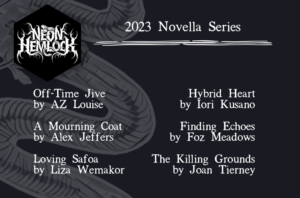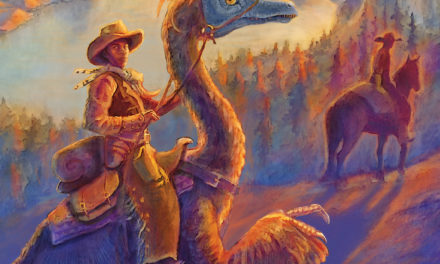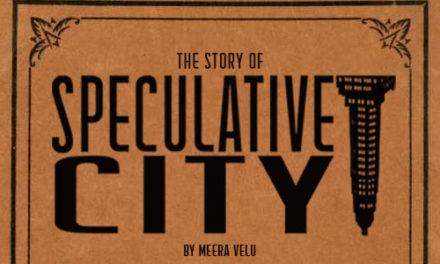Talking to Sentient Cities
Iori Kusano and Writing
Issue 13: QTPOC | 1,179 words

Iori Kusano is a queer Asian American writer, competitive Yu-Gi-Oh! duelist, and Extremely Ordinary Office Gremlin living in Tokyo. They are a graduate of Clarion West 2017, and their fiction has previously appeared in Apex Magazine and Baffling Magazine. Their debut novella, Hybrid Heart, is forthcoming from Neon Hemlock Press in 2023. Find them on Twitter @IoriKusano and Instagram as iori_stagram, or at kusanoiori.com.
——————–
LP Kindred: I’m very excited to talk to you for this demographic-targeted issue of Speculative City. You’re a writer, editor, con-runner, tarot reader, and bon vivant. Thanks for chatting with me!
Iori Kusano: I’m just happy to be here!
LP: I got the chance to read “Next Station, Shibuya” in Apex Magazine—a dazzling riff on a citizen’s love letter to their city – and “Together” in Baffling Magazine—a tender redefinition of self-love. These inventive and insightful stories made me wonder how you describe your work and what led you to the speculative?
Iori: I usually describe my work as passing kidney stones. Gross, I know, but the process of writing is gross for me! My writing is a mental and emotional purging process. I’m usually frustrated and agitated while doing it, and it’s all much more self-centered than is probably wise for me to admit. Writing is an act in which I try to pluck something hurtful out of my life, hold it at a distance, and maybe transform it into a metaphor so that I can engage critically with it even when it implies something unflattering about me.
But I don’t think anything in particular led me to spec fic; this is kind of where I’ve always been, mentally and emotionally. I’ve always been othered on some level by my identity or experiences, so writing about monsters or aliens isn’t really a stretch for me.
LP: ”Next Station, Shibuya” is set in Tokyo. I’ve never been to that city, but you made it real for me through descriptions of the commute and examples of culture. What is your perspective on worldbuilding, and how do you approach it?
Iori: I did no worldbuilding in that story, to be honest! Every location in that story is a real place. I was strongly inspired by how the game The World Ends with You is set on such an accurate rendering of Shibuya that, until recently, you could use the game maps to navigate the actual neighborhood. Recent construction has rendered parts of it out of date, and done the same to my story—a beloved Nepalese restaurant I mentioned has sadly been replaced with an Italian one. I was trying to do the literary geography I described in the story—creating a piece that was both a map and a time capsule, showing neighborhoods I loved at a particular moment in time before they’re remodeled again.
All I really do when writing setting is pay attention to hyper-specific detail: How does this particular prerecorded announcement sound? What shops do I pass on this particular street? What in their daily environment sparks joy for my protagonist? What irritates them? This is what makes a world feel lived-in for me. You don’t see it in this story, but food is also a major avenue of worldbuilding for me, especially in terms of availability, scarcity, price point, or supply chain.

LP: Neon Hemlock recently announced you’ll have a volume in their 2023 novella slate! That’s such exciting news for you and Neon Hemlock! Can you tell us about that story or how it came about for you?
Iori: If Hybrid Heart had a mood board, it’d be pictures of Hello! Project, VTubers, and checklists about identifying abusive relationships. If I had to spit out a reductive soundbite about it, the premise would be “what if The IDOLM@STER was honest about gender politics?”
A lot of different things went into it, but the primary ingredient was anger. My experience of existing in the world is that of having the pressure of an idealized feminine image and of premature sexualization and awareness of others’ gaze forced upon me, which is something I’m never going to forgive. Idols are subject to a much more extreme version of this; the entire industry rests on a foundation of disposable female bodies. The question that drives the plot is “at what point will you choose to stop being complicit in your own exploitation?”
LP: You’re one of the con-runners for BonFIYAH, the international arm of FIYAHCON which was nominated for its innovative approach to cons and inclusivity. How did you get involved? How’d you (and Vida Cruz) dream that bigger than any fringe content we’ve seen before?
Iori: When FIYAHCON was announced, I was chatting with a bunch of other authors in adjacent time zones to mine, and we were all in agreement that we wanted to get in on this, but not at four in the morning—which is often part of the cost of admission for virtual events based in America. So we reached out to L.D. Lewis and asked if maybe we could do two to three hours of late-night programming that would fall into our daytime hours.
Because L is the realest and most radical advocate for inclusivity in SFF I’ve ever met, she counter-offered with twelve hours of programming, full tech support, and access to the official broadcasting platforms. We had to jump on it because what con would ever give that kind of platform space to authors outside the Anglosphere time zones again? And then she agreed to offer free tickets for the BonFIYAH programming slate to make sure it was accessible to the Global South. It means so much to me that L was willing to invest in our work even at financial cost to FIYAHCON. L gave us the infrastructure to make something amazing.
I’ve said it over and over, but this would never have been so big without Vida. She’s my people person. Without Vida, we would have had five panelists and I probably wouldn’t have been on speaking terms with any of them by the end of the day. If she hadn’t been reaching out to people we never could have filled twelve hours, much less twenty-four in 2021.
LP: I know the novella is enroute but what else can we expect from you between now and then, across con-running, writing, editing, tarot readings, and other fandom related projects?
Iori: I have short stories coming out this year in Apex Magazine, Uncanny Magazine, and the upcoming Luminescent Machinations anthology from Neon Hemlock, all of which I’m very excited about. I’m also hoping to rank Platinum in Master Duel by the end of the year.
LP: If you had the time to write something for this particular issue of Speculative City, what would your story be about?
Iori: It’d have to be set in Oxford. I believe all cities are sentient, but that one was actively out to get me. That city is malicious. We’re all lucky I survived.
LP: Iori Kusano, thank you so much for taking the time out to chat with me.




